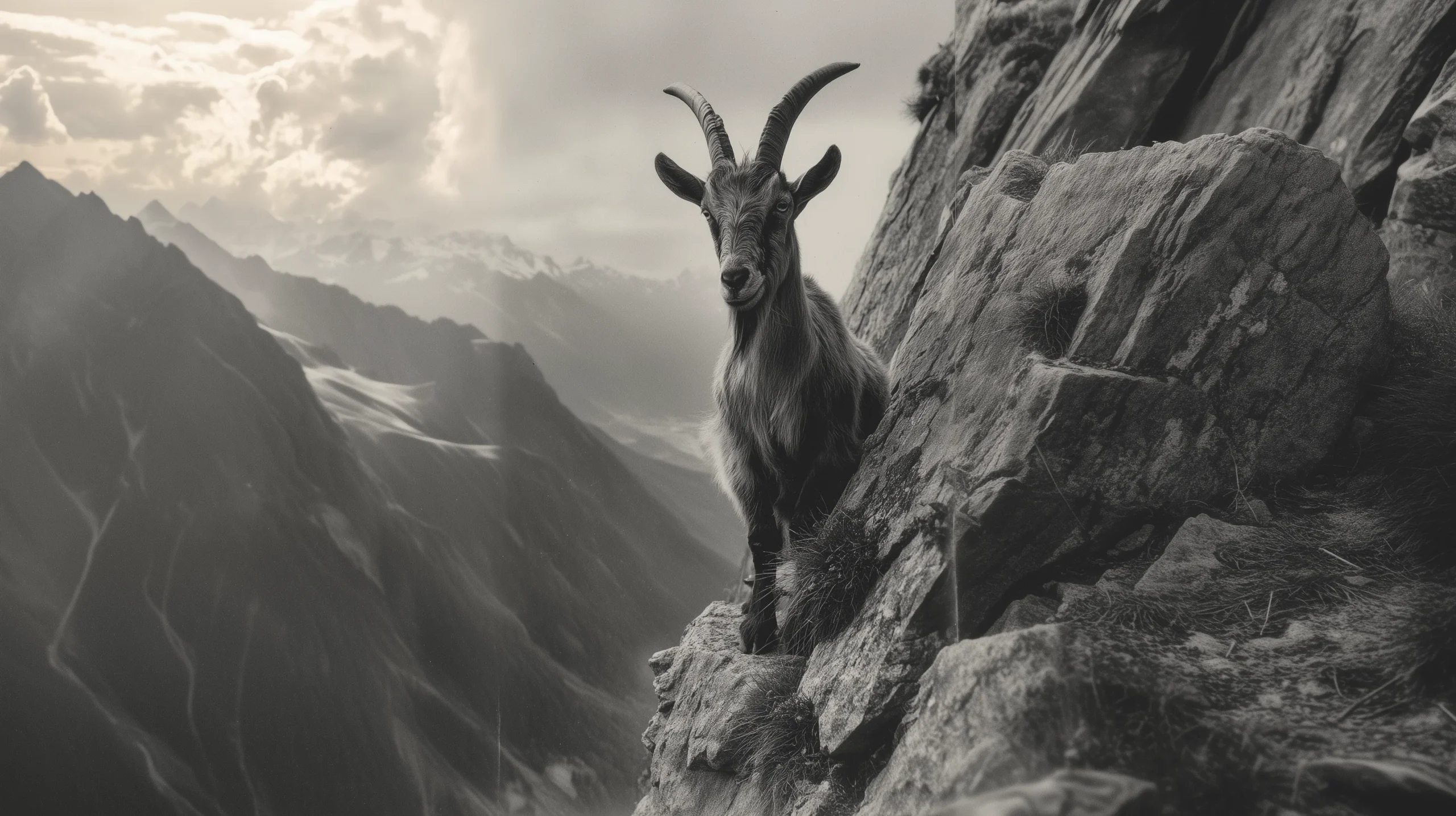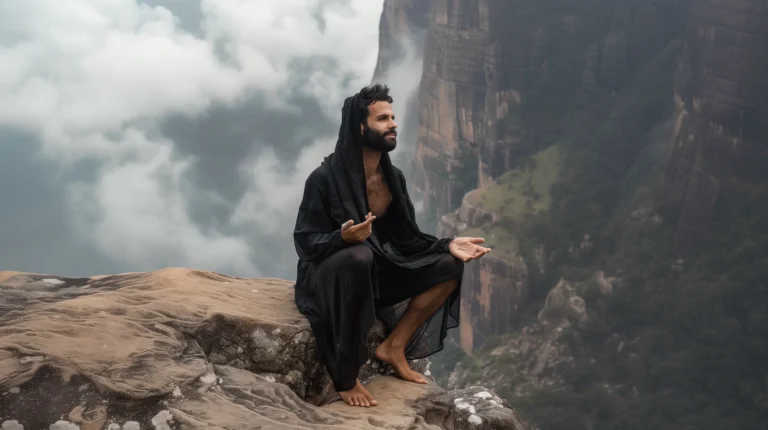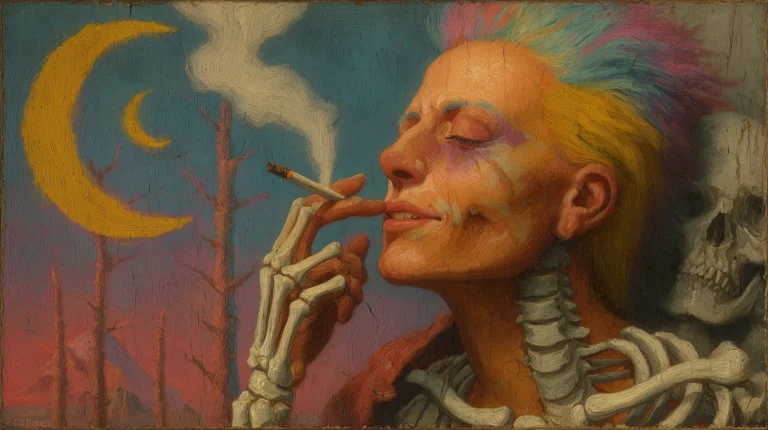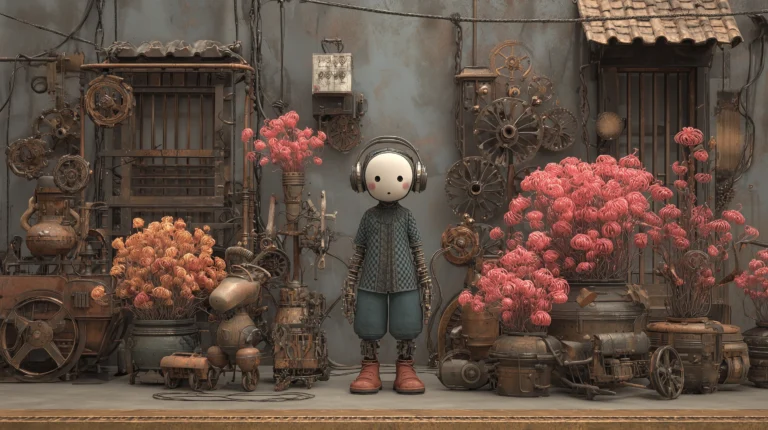Ashes Don’t Lie: You Are the Fire, the Burn, and the Search
“na tha kuch toh khudā thā, kuch na hotā toh khudā hotā
ḍuboyā mujh ko hone ne, na hotā main to kyā hotā”
— Mirza Ghalib (If nothing had existed, only God would have; had I not existed, I would never have drowned in being.)
Life begins with that puzzle: the moment something appears, the peace of pure possibility vanishes. We slip into names, jobs, tribes, deadlines—into the heavy coat of “I am.” Biology calls it the self‑model; poets call it the ego; boardrooms call it the brand. Whatever the label, it is the same thin film stretched over a single ocean of energy.
Ancient seers insisted there is no split between spirit and matter. The grain of rice, the neuron firing, the longing in your chest—all are ripples of one substance. Not parent and child, not judge and defendant, but water taking playful shapes. Dualistic theologies rewrote that script: God up there, creature down here, merit to be earned, punishment to be feared. Capitalism merely secularised the formula—profit as salvation, markets as final court. The result is a civilisation forever sprinting for external validation while its inner ground goes unexplored.
But if spirit and flesh are the same fabric, the chase collapses. There is nothing outside to win, no vault of moral credit to impress an external auditor. The suffocating necktie, the sleepless quest for legacy, the hashtags of borrowed outrage—each is just another costume in a one‑actor play. Step back and cloth, actor, and stage resolve into the same shimmering screen.
This manifesto invites you to test that recognition in the lab of ordinary days: walk slower, breathe deeper, spend your attention like the finite currency it is. When the old programme whispers, “Prove yourself—buy, post, compete,” remember that the voice is only your own echo bouncing off cultural walls. And echoes fade the moment you stop shouting.
“jalā hai jism jahāñ dil bhī jal gayā hogā
kurēdtē ho jo ab rākh, justujū kyā hai”
— Mirza Ghalib (Where the body has burned, the heart must have burned too; if you still scrape the ashes, what is it you are looking for?)
First, own the beast in the mirror
When we say “life is horrible,” what we really mean is “I haven’t looked at how I’m showing up.” Stanford neuro‑endocrinologist Robert Sapolsky offers the simplest biology lesson you’ll ever need: genes load the gun, but environment pulls—or refuses to pull—the trigger. The amygdala shouts “fight,” the still‑maturing frontal cortex whispers “think,” and the final script is always co‑written by context. Genes give you proclivities, not prison sentences. (Nsiteam)
Take‑away: aggression, anxiety, even generosity are tweakable once you recognise the levers around you.
The costume is cutting off our circulation
Modern fashion literally squeezes us. Medical reviewers list tight jeans, corsets and shapewear among the quiet saboteurs of gut health, triggering reflux and IBS flare‑ups. (Healthline) Lab work backs it up: EMG scans show that a jacket snugged to 100 % of chest circumference jacks up trapezius activity, distorts normal scapular motion and seeds chronic neck‑shoulder pain. (PMC)
Take‑away: Dress codes that promise status often bill you later—in chiropractor visits and antacid tablets.
A rigged Monopoly board
Since 2015 the world’s richest 1 % have pocketed an extra $33.9 trillion—enough to erase global poverty 22 times over. (Oxfam International) How do they keep it? Dynasty‑trust loopholes. Fresh legal analysis shows 80–90 % of fortune tucked inside U.S. family trusts may never face estate tax—about $4.5 trillion already parked outside public reach. (SSRN)
Take‑away: The “meritocracy” story collapses when the starting gun fires from inside grand‑dad’s vault.
Mental‑health smoke from an economic engine
Rich nations, richer symptoms. Depression affects 280 million people worldwide; prevalence in high‑income countries surged so fast during COVID that anxiety and depressive disorders doubled in several OECD members. (World Health Organization, OECD) The economic drag is brutal—mental ill‑health already eats 4.2 % of GDP each year, and the poorest households are 3.5× more likely to suffer severe symptoms. (OECD, OECD)
Take‑away: The race for “more” hands you trophies in one hand and prescription bottles in the other.
When faith is weaponised
In 2023, terrorism deaths jumped 22 % to 8,352. The hotspot has slid from the Middle East to Africa’s Central Sahel, where armed groups cloak power‑grabs in religious language. Ten countries now account for 87 % of all terror fatalities. (Vision of Humanity)
Take‑away: Extremists exploit spiritual hunger the same way marketers exploit status hunger—by selling identity as salvation.
Celebrity mirrors and mass distraction
We repost superstar selfies, borrow their politics, their diets, their outrage du jour. Meanwhile billionaires hire therapists with legal SSRIs, and the broke cling to after‑life IOUs. Different medications, same addiction: outsourcing meaning.
Three unglamorous exits from the play
- Slow everything down. Psychologists find that reducing speed increases presence, stretches subjective time and lowers stress. (Psychology Today)
- Interrogate the script. Before you buy, post, rage or pray—ask, Whose game am I playing?
- Decouple worth from wealth or worship. Your nervous system—and the planet—cannot bankroll infinite “more.”
The final math
One birth + one death = one chance.
The system is currently engineered to funnel cash upward, attention outward and hope forward into some hypothetical heaven. Yet the levers exposed by data—tax rules, advertising cues, travel speed—are human inventions. Humans can uninvent them.
So, walk slowly. Eat slowly. Notice the sky between skyscrapers. And when the eight‑billion‑person theatre feels unbearable, remember: the exit isn’t a revolution; it’s a quiet refusal to keep reading from a tired script.
When you’re in true flow, movement comes from your inner authority, not outside noise. Speed up only when it rises naturally from within—like a river finding its own course. Loosen your belt, let your stomach breathe, and trust the rhythm that is already yours.
Comprehensive Research Findings
- Big wealth gaps = big mental cracks. Nations where the 1 % hog the cash show sky‑high depression and anxiety. Coincidence? Nope—data screams it.
- Dynasty trusts are legal cheat codes. Billion‑dollar families skip estate tax, stack fortunes forever, and laugh while you debate “merit.”
- Hustle culture cooks your nerves. City blocks with the fastest walkers also spike cortisol and blood pressure. The race is literally killing you.
- Fashion pain is real pain. Skinny jeans, shapewear, stilettos—chic today, chronic back, foot, and gut problems tomorrow.
- Clicks feed bombs. Surges in online searches for extremist trash are followed by real‑world terror attacks. Your “just‑looking” fuels violence.
- Screen binge = mood plunge. Glue your eyes to a phone all day and watch anxiety and depression climb—income and degrees can’t shield you.
- Slow living is biochemical armor. Unhurried meals and mindful walks slash stress hormones and boost heart‑rate variability—science, not folklore.
- Inner drive beats inherited cash. Founders who say “I make my luck” out‑perform silver‑spoon startups every time. Mindset > trust fund.
Inner drive may out‑run old money, but the cash you court can still raise a monster. Every cute garage pup that guzzles venture capital risks mutating into Cronus—the titan who swallowed his own children. Grit isn’t holy, capital isn’t evil; untamed, both devour. Study the game, own every part of yourself, and stay whole.
Dig deeper: see the attached PDF for the full research and detailed findings.
If you scrape away all the flags, borders, and logos, what remains is a single species on a small blue rock, spinning through darkness and sunlight. The air that fills your lungs a moment ago will enter mine tomorrow. The minerals in your bones were once stardust in another corner of the galaxy. We are, in the most literal sense, the same matter in motion. Every separation we invent is lighter than a breath, yet the structures we build on those inventions can crush entire generations.
Marshall Rosenberg, the American psychologist who created Nonviolent Communication, spent his life inviting people to look beneath the surface of conflict. He wrote,
“Every violent act is a tragic expression of an unmet need.”
When a corporation refuses to pay a living wage, when a nation hoards grain behind tariffs, when a family locks its love in silence, the same diagnosis applies: needs are blocked, and the blockage hardens into violence.
Rosenberg also told us, “What I want in my life is compassion, a flow between myself and others based on a mutual giving from the heart.” He believed the deepest human currency is not money, power, or doctrine but the raw movement of needs met and gifts returned. Food is a gift, safety is a gift, respect is a gift, and so is honest speech. Economies and governments are simply delivery systems for those gifts. When the systems work, prosperity feels like fresh air. When they break, misery blooms like mold.
The Shared Ledger of Needs
Imagine standing on a shoreline at low tide. You can trace every contour of the bay, each rock and pool exposed. Needs are like that coastline. They are universal and visible—food, water, shelter, autonomy, belonging, dignity. They are the unshakable shape of human life. Wall Street derivatives, secret trust funds, and ideological slogans are passing waves compared to them. Whenever a policy or tradition lets one child go hungry, or drives one parent to despair, the tide has simply gone out far enough to show a crack in our system. The crack never belongs to that child or parent; it belongs to us.
Rosenberg warned,
“Labels and moralistic judgments shift our attention from ourselves and others’ needs.”
A billionaire might label the poor as lazy, while a struggling worker might label the rich as greedy. Both labels distract from the unmet needs beneath: security, recognition, meaning. When we focus on the labels, we fight; when we focus on the needs, we collaborate.
Earth Is the First Commons
The planet itself is the first delivery system. Rivers, forests, and soil operate with no patent and no marketing team. They offer abundance on one condition: that we remember we are tenants, not owners. The economist Herman Daly once said that modern growth treats the earth like a business in liquidation; it sells off the furniture for quick cash and calls it profit. Rosenberg’s lens upgrades that metaphor. Liquidating the earth is not just bad accounting, it is a sign that the need for short-term security is suffocating the need for long-term survival.
A fair system would begin by mapping resources to needs rather than to profit. Clean water to every household before sparkling water in luxury spas. Nutritious staples to every market before boutique diets. Education for every child before private tutoring for the already advantaged. These priorities sound radical only because our current ledger is upside down.
The Middle Class as Shock Absorber
Around the world, the middle class functions like the elastic band of society. It absorbs prices, taxes, and tithes; it funds pilgrimages and school fees; it invests in startups and cushions recessions. Yet when crises strike—pandemics, wars, climate shocks—the same band is first to fray. The super-rich diversify and the ultra-poor already survive on near-nothing, but teachers, nurses, shopkeepers, and technicians face the full blast of every downturn.
Rosenberg frames this dynamic elegantly:
“Punishment is the root of violence on our planet.”
A regressive tax, a predatory loan, or a hidden surcharge is a form of punishment for simply being in the middle. It says, Pay more, give more, carry more, or risk falling into poverty. The solution is not to swap one elite for another but to redesign the system so that everyone’s basic needs are protected before anyone’s luxuries are subsidized.
Practical Compassion
Compassion is often misread as soft or naive. Rosenberg called it an
“active interest in the inner reality of others.”
In economic terms, it is the due diligence we perform before drafting policy. A compassionate budget asks, How will this affect a single mother in Mumbai, a farmer in Uganda, a retiree in Ohio? A compassionate law wonders, Does it reduce fear and meet needs, or does it increase fear and mask needs?
Nonviolent Communication offers four simple moves—observation, feeling, need, request. Observe without judgment, name the emotion, identify the unmet need, and make a clear request. Scaled up, these moves become governance principles. A city that observes rising homelessness, feels concern, identifies the need for affordable housing, and requests funding to build shelters is practicing systemic compassion.
Beyond Blame, Toward Belonging
If blame solved anything, the world would be healed by now. Rosenberg cautioned that blame creates enemies out of people who might have become partners. To say that Saudi oil money, Christian megachurches, Hindu gurus, or Jewish nonprofits are “evil” is to freeze them in caricature. The real invitation is to retool their immense energies toward universal needs. Oil revenues can fund green transitions. Tithes can sponsor free clinics. Spiritual gatherings can become platforms for ecological restoration. The critical eye stays sharp, but the heart keeps its door open to transformation.
A Collective Request
Rosenberg ends many dialogues with a request because a request invites cooperation. Here is a collective request for our species:
“Share the earth as if every child were your child. Craft systems that feed, heal, and educate before they reward, entertain, or dominate. Speak so your words reveal needs, listen so your ears catch needs, negotiate so every party leaves with at least one need met. For every budget line, every policy plank, every personal choice, ask whose hunger lessens, whose fear subsides, whose dignity rises. If the answer is none, write a new line.“
The Possible Sunrise
“This is what compassion does,” Rosenberg said. “It can make a human being forget to distinguish between roles and remember their shared nature.” The moment we remember, the calculations flip. Profit is pointless if it costs the oceans their coral, ideology is hollow if it inflames more hunger, victory is empty if it leaves orphaned hearts across the border.
A sunrise where every household has clean water, every child a plate of food, every adult a voice in their future—such a sunrise is not utopian, it is the logical endpoint of needs met and gifts circulated. The resources exist; the technology exists; the wisdom traditions already preach it. What remains is courage, coordination, and the radical listening that Rosenberg taught.
The earth does not ask us to be perfect, only present. Present enough to feel our own needs without shame, present enough to hear our neighbor’s needs without judgment, present enough to weave policies that honor both. Shared presence matures into shared justice, and shared justice blooms into shared peace.
In that peace, borders look like pencil marks on a bright canvas, ready to be erased or redrawn for the good of all. Religions return to their roots as guides to wonder, not monopolies on truth. Markets return to their function as exchangers of value, not extractors of life. Governments return to their mandate as caretakers, not gatekeepers.
When that day comes, we will breathe the same breath with lighter hearts, walk the same earth with lighter steps, and finally recognize the simple promise hidden under every conflict: we belong to each other, and that belonging is the birthplace of every lasting solution.
The Naked Ledger
Religion, Inc.
1. Faith is a trillion-dollar market.
- Add up donations, media, schools, hospitals, halal/kosher brands and tourist flows and “the global faith economy” tops US $1.2 trillion a year—more than Apple and Microsoft combined. (religiousfreedomandbusiness.org)
2. Saudi Arabia runs the world’s most profitable “branch.”
- Oil still juices the kingdom, but religious tourism now brings in an extra US $12 billion a year and is targeting US $343 billion by 2034 as Vision 2030 ramps Hajj/Umrah volumes. (Statista, Future Market Insights)
3. Pilgrimage is priced like a luxury IPO—paid by the middle class.
- A basic 2025 Hajj package from London starts around £4,695 (Islamic Travel UK, Muslims Holy Travel). Mid-range options typically fall between £6,500–£8,000, while five-star non-shifting packages top £9,000 and can exceed £9,850. In the U.S., families report spending $40,000–$50,000 for four people depending on services and accommodation (Reddit Hajj 2025 thread).
4. Money flows one-way: Mecca gets upgrades, your savings get drained.
- Eighty-percent of Hajj spend lands in Saudi hotels, airlines, and government fees, then funnels into mega-projects and sovereign funds. Pilgrims go home to mortgages and credit-card bills.
5. The middle class is the eternal ATM.
- OECD data show middle incomes barely move while essentials soar; 73 % of U.S. middle-income households cut non-essentials in 2025 just to cope. Yet they still fund pilgrimages, tithes, and charity drives that keep the faith economy humming. (OECD, MarketWatch)
6. Extreme rich and extreme poor skip the squeeze.
- Billionaires write off donations, fly in on private jets, or own the hotels. The very poor are priced out entirely. The financial load concentrates on those in the middle—the “balancers” capitalism claims to cherish.
7. Tax law treats religion like a charity, accountants treat it like a corporation.
- In the U.S. alone, tax-exempt religious assets equal the top-15 national economy. No shareholder reports, no corporate tax, total brand power. (religiousfreedomandbusiness.org)
8. Result: a faith monopoly with oil-money turbo.
- Saudi controls the holy sites, controls visas, controls packages. Competing Muslim nations must send their citizens—and their cash—to the Kingdom.
Religion sells hope the way corporations sell phones. The extreme ends of the wealth barbell shrug; the middle class bankrolls both heaven’s marketing budget and the earthly profits of petro-states and megachurches.
Guru Culture, Inc.
- India’s “holy market” is worth US $58 billion in 2024 and is forecast to triple to US $151 billion by 2034. That is bigger than India’s entire space budget. (OpenPR)
- Isha Foundation: US $19 million revenue (US arm) + £6.4 million in the UK. (ProPublica, Charity Register)
- Art of Living: US $25.9 million estimated annual haul. (Growjo)
- Patanjali (Ramdev): ₹9,335 crore revenue ≈ US $1.1 billion in FY 24, five-fold profit jump. (The Economic Times, Business Standard)
- Tax halos keep the cash pure. Religious trusts pay zero corporate tax on donations and land; many properties are also exempt from local levies. (Casemine)
- Course fees punch the middle class. Inner Engineering in-person ticket: US $345; H-Town retreat weekends run higher. (online.innerengineering.com) Art of Living “Happiness” programs clock similar price tags. (Art Of Living (United Kingdom))
- The new IPO is “Inner Peace Online.” India now hosts 950+ faith-tech startups and drew US $50 million VC money in 2024 alone. (The Verge)
- Middle incomes bleed so the extremes glide. Poor devotees are priced out; billionaires fly in, donate, and deduct. The economic weight lands squarely on salary-class believers.
- Scandals follow the money. Isha wrestles fresh sexual-abuse claims while defending land-grab suits—yet the donation meter keeps spinning. (The Times)
- Pilgrim economy keeps Saudi rich; guru economy keeps Indian moguls richer. Same model: sell salvation, mark up the ticket, rinse, repeat.
- Reality check: A ₹50 k meditation package does not buy enlightenment; it buys an ashram’s next land parcel.
- Solution: Audit gurus like corporations, tax the empire, and let seekers keep their wallets—because awakening shouldn’t need a swipe machine.
How a Cosmic Yogi Became War Branding in Today’s India
“Har Har Mahadev” went from temple chant to battle cry.
- Maratha Light Infantry and several other regiments scream it before charging — official Indian-Army doctrine lists it as their war shout. (Jagran Josh)
- It leaks into street politics as “Har Har Modi,” turning a deity’s name into an election slogan and drawing Election-Commission complaints for using Shiva’s portrait as a rally backdrop. (www.ndtv.com, The Economic Times)
Missiles and warships wear his weapon.
- DRDO christened a surface-to-air missile “Trishul” — Sanskrit for Shiva’s trident — and the navy sails INS Trishul bearing the same crest. (Wikipedia, Facebook)
- Defence blogs openly frame the name as a “ferocious weapon of Lord Shiva,” blending myth and militarism. (DDE)
Right-wing merch turns the destroyer into a hype mascot.
- A new icon set shows a ripped, sunglass-wearing, weed-smoking Shiva on T-shirts, posters and memes — scholars call it “extension of right-wing nationalism through Hindu iconography.” (Hyperallergic)
From chant to chest-thump in campaign season.
- Election rallies now blast Shiva slogans alongside anti-Pakistan rhetoric; analysts describe it as “weaponising Hinduism” to cast every vote as a holy war. (Al Jazeera)
The mythic narrative fits modern conflict.
- Shiva’s archetype—the destroyer who resets cosmic order—maps neatly onto calls for “surgical strikes,” “purging the enemy,” and “tearing down the old.” Politicians, arms-marketers and street mobs all borrow his imagery to license aggression.
Who pays?
- Middle-class taxpayers bankroll the missiles; middle-class voters buy the T-shirts; middle-class soldiers chant the war cry on the line of control—while billion-rupee defence contracts and vote banks pile up at the top.
Naked truth.
- A deity once invoked for transcendence now props up ballistic branding and ballot-box rage. Shiva doesn’t change—our marketing does. Recognise the archetype, refuse the manipulation, break the trance.
Christianity Inc.
- Faith cash rivals Big Tech. Religion pumps $1.2 trillion a year into the U.S. economy, larger than Apple + Google combined. (LSA Technology Services)
- Megachurches = untaxed empires. Hillsong alone pulled nearly $100 million a year before scandals broke. (TIME)
- Zero-filing, zero-oversight. U.S. law blocks the IRS from even opening a church inquiry unless a top Treasury official signs off—so audits are vanishingly rare. (IRS)
- Tax-exempt sector now hoards $8 trillion in assets; churches share the shelter but none of the reporting duty. (Tax Foundation)
- Lost revenue = public subsidy. Forgone church taxes are pegged between $76 billion and $85 billion each year—money every other taxpayer back-fills. (Tax Foundation)
- Prosperity pastors, pandemic payday. Dozens of clergy have pleaded guilty for siphoning six- and seven-figure PPP loans into cars, travel, and fast food. Recent cases top $400,000 each. (Department of Justice, ministrywatch.com)
- Luxury on the Lord’s dime. Hillsong and other megachurch leaders sit on multimillion-dollar mansions and condos while calling for fresh tithes. (The Daily Telegraph)
- Christian nationalism turns pulpits into war drums. FBI & DHS list rising Christian-identity and nationalist extremists as a key homeland threat; recent plots include kill-lists and state-house shootings. (The Week, Program on Extremism)
- Middle class foots the bill. Billionaires deduct donations; the poor stay priced out; salaried believers tithe, buy merch, and finance pilgrimages while wages stagnate.
- Bottom line: Christian mega-brands preach humility, bank untaxed billions, and—at the militant fringe—feed real-world violence. Audit the books, tax the hustle, and stop mistaking a halo for a business license.
And when it comes to the founders of Judaism, I can’t say anything—there’s no free speech. I’ll be vanished tomorrow. Yahweh will strike me like the Tower of Babel, and I’m afraid to even speak about it.
When we finally see that spirit and soil are the same fabric, the arguments fall silent. The Earth is not a warehouse to loot or a school we may graduate from. It is the living body we share, home and self at once. The moment creator and created merge in our understanding, the sky no longer holds a distant rescuer, and blame has nowhere to land. All that remains is our own hand on the steering wheel and the common laws that guide our ride.
So we choose. We choose food that keeps the body clear. We choose work that serves needs before greed. We choose rules that let resources circulate like blood through a healthy heart. With needs met and fear quiet, energy is freed for play. We write songs instead of slogans, craft tools instead of weapons, turn commerce into collaboration and politics into neighbourly debate. We become gardeners of a single, vast home.
Then life stops being a contest in scarcity and grows into an art of mutual flowering. Your joy feeds mine, my insight sparks yours, and the planet itself breathes easier. No saviour descends from the clouds, because no saviour is needed. The saving is already built into our hands, our minds, and our shared ground.
“If it doesn’t end in love, the story’s still being told. One life, one chance—let love be the final hold.”
Beating Back the Crocodile, Meeting the Self, and Letting Love Speak the Last Line
The ancient Egyptians pictured the after‑death journey as a river swarming with hazards. Among them lurked the crocodile, a perfect emblem of anything that bites, steals, or drags the soul away from its purpose. In Spell 31 of the Book of the Dead the traveller stands firm and speaks:
“Get thee back, crocodile that dwells in the west.
Get thee back, crocodile that dwells in the south and in the north.
I hold the words of power in my hand. What has not yet appeared already lives in my body.”¹
By naming the beast and declaring mastery over “words of power,” the soul does more than scare a monster. It offers a lesson that reaches far beyond Egyptian tombs. Each of us carries at least one inner crocodile: fear, resentment, self‑doubt, habits that chew at the mind. The rite insists that no outer weapon is needed; a clear voice and a remembering heart are enough to turn the creature aside.
After driving the crocodile away, the same papyrus has the soul list every part of its body and match it to a god. “My eyes are the eyes of Hathor, my backbone is the backbone of Suti, my lips are the lips of Anpu.” The roll reads like a map of divinity that was never outside the traveller at all. The gods have always been limbs of a single, hidden Self, waiting for recognition. Joseph Campbell compared this moment to Krishna’s declaration, “I am the Self, seated in the hearts of all creatures.”²
Yet the scroll does not stop with power. It ends with what scholars call the “Negative Confession,” a calm review of one’s life: I have not stolen, I have not murdered, I have not broken trust. Morality turns out to be the clearest evidence of awakening. Self‑knowledge without compassion is unfinished business. The crocodile may have been pushed under, but the current still needs to carry the boat toward something larger than victory.
That larger destination is love. The anonymous scribe who copied Spell 31 could not have written our modern line, “If it does not end in love, the story is still being told.” Even so, the whole architecture of the Book of the Dead bends toward that truth. Each spell peels away a fear, a scar, or an illusion. Each declaration widens the traveler’s circle of care until nothing remains outside the heart. By the final chapter the soul can say, “I am Yesterday, Today, and Tomorrow,” and in that timeless vision, separation dissolves.
So the crocodile must die, not in blood, but in understanding. When the inner beast no longer finds a place to grip, it slips back into the dark water and becomes part of the river itself. What remains is one life, one chance, and one command worth repeating: let love be the final hold.
References
- Spell 31, Papyrus of Ani (Book of the Dead), Eighteenth Dynasty.
- Campbell, J., The Hero with a Thousand Faces (1949), Part II, “Dissolutions – End of the Microcosm.”
In myth and psychology the crocodile archetype represents raw survival instincts, lurking danger, and the shadow side of the self, yet it also guards thresholds and signals rebirth because it moves between water and land. So it embodies both destructive power and the possibility of deep transformation.
“The higher will (goat) has bitten down on the devouring instinct (crocodile); the shadow is no longer in charge.”
The Mirror of Worlds
When we lift our eyes to the night sky we are also peering into ourselves. A galaxy’s spiral repeats the swirl on a fingertip and the red storm on Jupiter mirrors a hush of thunder in the heart. The small world and the great world sing one melody, each an echo of the other.
To give that hidden music shape, people told stories. They cast the boundless in masks of gods and heroes so the formless could meet us face to face. In every legend the universe borrows a human tongue.
Every honest journey begins with a crack—loss, failure, love undone. Through the fracture we glimpse a brightness too wide for names. Stepping through, we watch idols crumble, titles burn, kingdoms empty into silence. Each ruin is only plaster falling from the living truth beneath.
Beyond the break the light waits to move through flesh. Mind can only point; the body must carry. The ordinary heart learns to beat in cosmic time and the timid breath must open for worlds. Personal constellations scatter so a larger sky can appear.
Outer storms mirror inner ones: boiling seas reflect unsealed feelings and falling stars echo ideas collapsing. When the self finally turns in perfect rhythm with the universe, quiet spreads across the shattered field.
The broken mask lies ready for a new bearer. Wearing it is a task, not a prize. The traveler who returns aglow must hoe gardens, mend roofs, soothe quarrels. Light that feeds no one becomes a glare that blinds. Creation begins again after every ending and it needs willing hands.
Physics whispers the same lesson. Entropy climbs, forms loosen, stars spend their fire; yet every dying sun scatters seeds for new worlds. The fall of the small and the great becomes raw matter for another dawn. The circuit closes, energy flows on, and the universe rewrites its song.
Where the world seems to end the deeper self begins. Where the self dissolves the world is born again. Hold both, and the rhythm of the galaxies will answer in your pulse.
‘New’ to Enter Your Life.
Come, even if your footfall shatters the fragile hush I guard.
I have learned that every wound becomes a doorway,
and every tear sketches a map beyond its own salt.
Arrive with excuses or silence or half‑hidden truth.
Let the old hope tremble again in my chest,
for only a cracked shell can free the hidden bird.
So come, even if you intend to leave once more.
Your leaving will be another summons,
and I will carry your echo like a lantern in the mist.
Love is no promise of peace.
When you arrive you are the dragon;
when you depart you become the star that guides me home.
The mask I broke, the tragedy that unveiled itself,
is the very shape I must now wear.
And I walk on, as the very silence
I once tried to uncover in innocence.
Let Love Be The Final Hold.







